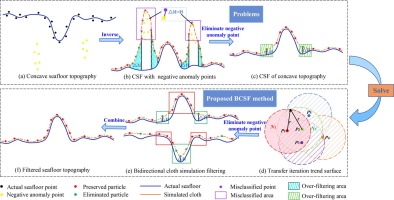ISPRS Journal of Photogrammetry and Remote Sensing ( IF 10.6 ) Pub Date : 2020-03-09 , DOI: 10.1016/j.isprsjprs.2020.03.004 Anxiu Yang , Ziyin Wu , Fanlin Yang , Dianpeng Su , Yue Ma , Dineng Zhao , Chao Qi

|
Current filtering methods of airborne LiDAR bathymetry (ALB) point clouds cannot identify negative anomalies or avoid over-filtering of the data. To overcome these problems, we propose a bidirectional cloth simulation filtering (BCSF) method and verify it using captured data. First, a transfer iterative trend surface is established to eliminate the negative anomalies and realize the continuous expression of the seafloor topography. The terrain complexities of the seafloor points are calculated using four extracted feature factors: slope, standard deviation of depth, Gaussian curvature, and roughness. We then calculate the sub-regional terrain complexity and the adaptive distance threshold and obtain user-defined parameters. Finally, sub-regional filtering is carried out, and a filtered surface is established to solve the over-filtering problem of convex and concave seafloor topographies based on the BCSF correction model. To evaluate the performance of the proposed method, the BCSF method was applied to ALB data captured around Yuanzhi Island in the South China Sea. The experimental results show that the BCSF method effectively filters out non-seafloor points and fully preserves the seafloor microtopography to realize the integrity of the seafloor topography. The proposed BCSF method outperforms the cloth simulation filtering method in terms of the elimination rate, which decreases from 38.78% to 2.52% and from 29.52% to 0.70% in the whole study area and local study area, respectively. Consequently, the BCSF method that combines forward filtering with inverse filtering exhibits complementary advantages, avoids over-filtering, and demonstrates strong adaptability and robustness for ALB data.











































 京公网安备 11010802027423号
京公网安备 11010802027423号